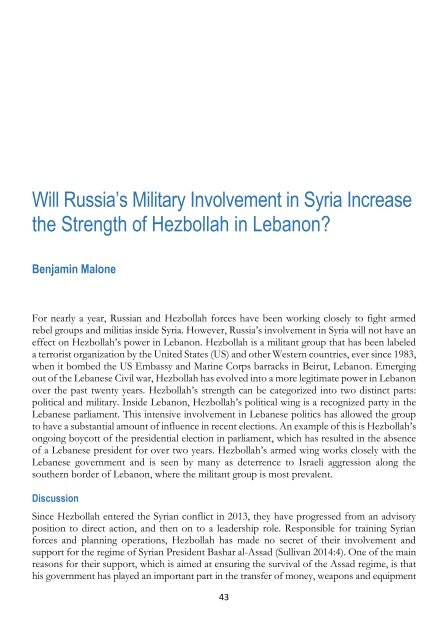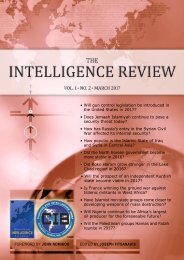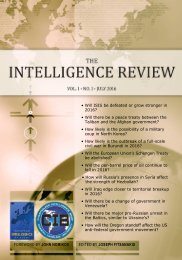The Intelligence Review | vol. 1 | iss. 1 |
This volume is the product of a collaboration between the European Intelligence Academy (EIA) and the Chanticleer Intelligence Brief (CIB), a student-run initiative supported by the Department of Politics at Coastal Carolina University in Conway, South Carolina, United States. Eleven CIB analysts tackle some of the most pressing and timely questions confronting intelligence observers today. Topics range from the price of oil to political stability in Venezuela, from the territorial cohesion of Iraq to the future of the Islamic State, and many other pressing subjects that feature daily in news headlines. CIB analysts propose carefully crafted and informed forecasts that outline future developments in some of the world's most unpredictable hot spots.
This volume is the product of a collaboration between the European Intelligence Academy (EIA) and the Chanticleer Intelligence Brief (CIB), a student-run initiative supported by the Department of Politics at Coastal Carolina University in Conway, South Carolina, United States. Eleven CIB analysts tackle some of the most pressing and timely questions confronting intelligence observers today. Topics range from the price of oil to political stability in Venezuela, from the territorial cohesion of Iraq to the future of the Islamic State, and many other pressing subjects that feature daily in news headlines. CIB analysts propose carefully crafted and informed forecasts that outline future developments in some of the world's most unpredictable hot spots.
- No tags were found...
You also want an ePaper? Increase the reach of your titles
YUMPU automatically turns print PDFs into web optimized ePapers that Google loves.
Will Russia’s Military In<strong>vol</strong>vement in Syria Increase<br />
the Strength of Hezbollah in Lebanon?<br />
Benjamin Malone<br />
For nearly a year, Russian and Hezbollah forces have been working closely to fight armed<br />
rebel groups and militias inside Syria. However, Russia’s in<strong>vol</strong>vement in Syria will not have an<br />
effect on Hezbollah’s power in Lebanon. Hezbollah is a militant group that has been labeled<br />
a terrorist organization by the United States (US) and other Western countries, ever since 1983,<br />
when it bombed the US Embassy and Marine Corps barracks in Beirut, Lebanon. Emerging<br />
out of the Lebanese Civil war, Hezbollah has e<strong>vol</strong>ved into a more legitimate power in Lebanon<br />
over the past twenty years. Hezbollah’s strength can be categorized into two distinct parts:<br />
political and military. Inside Lebanon, Hezbollah’s political wing is a recognized party in the<br />
Lebanese parliament. This intensive in<strong>vol</strong>vement in Lebanese politics has allowed the group<br />
to have a substantial amount of influence in recent elections. An example of this is Hezbollah’s<br />
ongoing boycott of the presidential election in parliament, which has resulted in the absence<br />
of a Lebanese president for over two years. Hezbollah’s armed wing works closely with the<br />
Lebanese government and is seen by many as deterrence to Israeli aggression along the<br />
southern border of Lebanon, where the militant group is most prevalent.<br />
Discussion<br />
Since Hezbollah entered the Syrian conflict in 2013, they have progressed from an advisory<br />
position to direct action, and then on to a leadership role. Responsible for training Syrian<br />
forces and planning operations, Hezbollah has made no secret of their in<strong>vol</strong>vement and<br />
support for the regime of Syrian President Bashar al-Assad (Sullivan 2014:4). One of the main<br />
reasons for their support, which is aimed at ensuring the survival of the Assad regime, is that<br />
his government has played an important part in the transfer of money, weapons and equipment<br />
43





